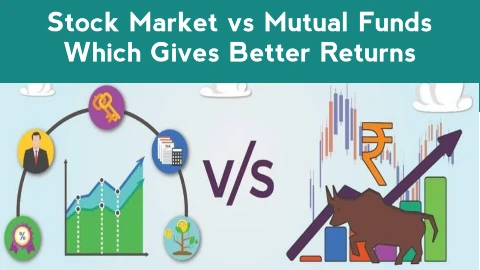Introduction: The Fundamental Choice Every Investor Faces
One of the most common dilemmas for new investors is whether to buy individual stocks or invest through mutual funds. It’s a choice between taking the wheel yourself or hiring a professional driver for your financial journey. Both are valid paths to wealth creation, but they cater to different personalities, skill sets, and levels of involvement.
In 2025, understanding this distinction is more crucial than ever. Let’s break down the key differences to help you decide where to put your money.
The Head-to-Head Breakdown
Individual Stocks: The Path of the Active Investor
When you buy a stock, you are purchasing a direct ownership share in a single company.
- Control & Focus: You have complete control over which companies you invest in and when you buy and sell.
- Potential for Outperformance: A well-researched stock pick can significantly outperform the broader market.
- Direct Impact: Your returns are directly tied to the performance of that specific company.
- High Risk from Lack of Diversification: If that one company fails or underperforms, your investment can suffer greatly. Your portfolio’s health is tied to a single stock’s fate.
- Time & Expertise Required: Successful stock picking demands continuous research, analysis of financial statements, and staying updated on market news.
- Emotional Volatility: Watching a single stock’s price swing wildly can lead to panic selling or greedy buying.
Analogy: Stock picking is like being a scout for a baseball team, trying to find the one rookie who will become a superstar.
Mutual Funds: The Path of the Diversified Investor
A mutual fund pools money from thousands of investors to buy a diversified portfolio of stocks, bonds, or other assets, managed by a professional.
- Instant Diversification: Your money is spread across dozens or even hundreds of companies, drastically reducing the risk of a single company’s failure impacting your entire investment.
- Professional Management: Expert fund managers make the day-to-day buying and selling decisions.
- Accessibility & Convenience: You can start with a small amount (as low as ₹500) through a Systematic Investment Plan (SIP), making it perfect for beginners.
- Management Fees (Expense Ratio): You pay for professional management, which slightly eats into your overall returns.
- Less Control: You cannot choose the individual stocks within the fund; you are trusting the fund manager’s strategy.
- “Average” Returns: A fund is designed to match or slightly beat the market average, not to deliver explosive, stock-like gains from a single pick.
Analogy: Investing in a mutual fund is like buying the entire league’s team. You might not get the one superstar, but you also avoid the risk of your one pick being a total bust.
Direct Comparison: Stocks vs. Mutual Funds
| Feature | Individual Stocks | Mutual Funds |
|---|---|---|
| Risk Level | High (Company-specific risk) | Moderate (Diversified risk) |
| Potential Return | Very High (or Very Low) | Market Average (10-15% long-term) |
| Diversification | Low (You must build it yourself) | High (Built-in) |
| Cost | Brokerage Fees | Expense Ratio & Management Fees |
| Time & Effort | High (Research Intensive) | Low (Hands-off) |
| Skill Required | Advanced (Analysis Skills) | Beginner-Friendly |
| Investment Minimum | Price of 1 share | Can be very low (e.g., ₹500 SIP) |
Returns Comparison: A Realistic Scenario
- The Stock Pick (High-Risk, High-Reward):
- You invest ₹50,000 in a promising tech startup in 2022.
- Best Case: By 2025, the company thrives and the stock grows 300%. Your ₹50,000 becomes ₹2,00,000.
- Worst Case: The company struggles and the stock falls 70%. Your ₹50,000 becomes ₹15,000.
- The Mutual Fund SIP (Steady, disciplined growth):
- You start a ₹2,000 monthly SIP in a diversified equity mutual fund in 2022.
- Realistic Case: Assuming a 12% annual return, after 3 years (36 months), your total investment of ₹72,000 would have grown to approximately ₹91,000.
- The power of averaging and compounding creates steady, less volatile growth.
Who Should Choose What? A Simple Guide
Choose Individual Stocks if you:
- Have the time and passion to research companies.
- Can handle high risk and volatility without panicking.
- Have a long-term horizon to ride out market swings.
- Are comfortable with the possibility of significant losses for the chance of outsized gains.
Choose Mutual Funds if you:
- Are a beginner or a busy professional with little time to manage investments.
- Want to minimize risk through instant diversification.
- Prefer a “set-it-and-forget-it” approach via SIPs.
- Are building wealth for long-term goals like retirement steadily and reliably.
The Smart Investor’s Compromise
You don’t have to choose just one. A hybrid approach is often the most prudent strategy:
- Core Portfolio (80-90%): Build a solid foundation with diversified mutual funds (e.g., Index Funds, Flexi-Cap Funds).
- Satellite Portfolio (10-20%): Use a smaller portion of your capital to invest in individual stocks you’ve thoroughly researched and believe in strongly.
This strategy gives you the stability of diversification while still allowing you the excitement and potential upside of direct stock picking.
Conclusion: It’s About Your Journey, Not Just the Destination
The question isn’t “Which is better?” but “Which is better for me?”
- Mutual Funds are the efficient, reliable train that gets you to your financial destination safely with a guide.
- Individual Stocks are the self-driven car—potentially faster and more direct, but with a higher risk of getting lost or crashing if you’re not a skilled driver.
For most investors, especially those starting out, building a core portfolio with mutual funds is the wisest first step. As you gain knowledge and experience, you can then carefully explore the world of individual stocks.
The most important step is to start investing—consistently and for the long term—regardless of the vehicle you choose first.
Are you a stock picker or a mutual fund investor? Share your philosophy and what influenced your choice in the comments below!






